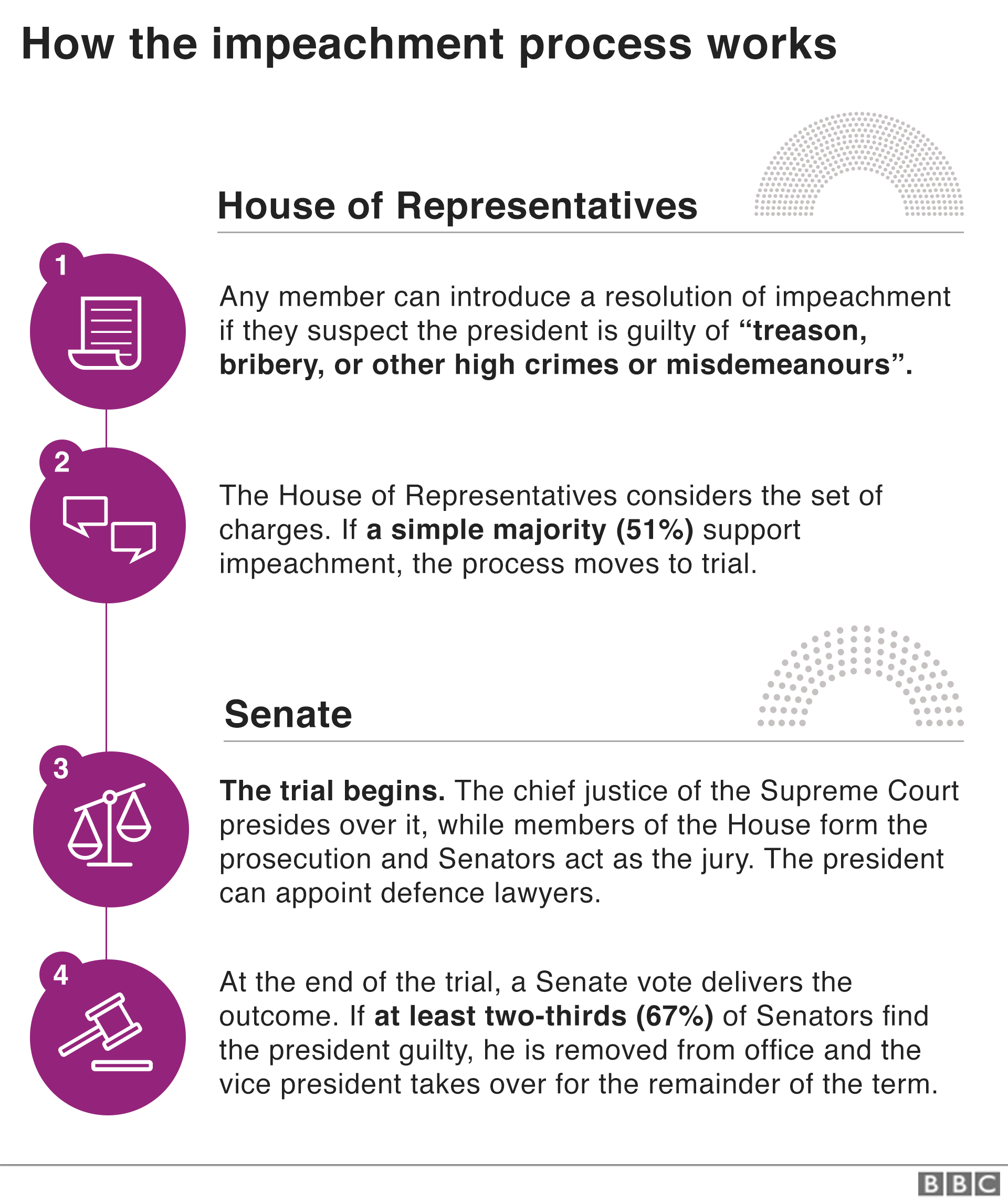Trump: Impeach me and the market crashes
- Published
A law professor outlines President Trump's perilous legal situation
US President Donald Trump has responded to speculation that he might be impeached by warning that any such move would damage the economy.
In an interview with Fox & Friends, he said the market would crash and "everybody would be very poor".
He was speaking after Michael Cohen, his ex-lawyer, pleaded guilty to violating election laws and said he had been directed to do so by Mr Trump.
Mr Trump has rarely spoken about the prospect of being impeached.
Correspondents say it is unlikely Mr Trump's opponents would try to impeach him before November's mid-term elections.
Why does Trump say the market would crash?
"I don't know how you can impeach somebody who's done a great job," Mr Trump told Fox and Friends.
"I tell you what, if I ever got impeached, I think the market would crash, I think everybody would be very poor."
Pointing to his head, he said: "Because without this thinking, you would see numbers that you wouldn't believe in reverse."
Allow X content?
This article contains content provided by X. We ask for your permission before anything is loaded, as they may be using cookies and other technologies. You may want to read X’s cookie policy, external and privacy policy, external before accepting. To view this content choose ‘accept and continue’.
What did he say about hush money?
Cohen says he handled hush money payments to two women during the 2016 presidential campaign.
The two women, thought to be porn star Stormy Daniels and former Playboy model Karen McDougal, both claimed they had affairs with Mr Trump,
Under oath, Cohen said he had paid the money "at the direction" of Mr Trump, "for the principal purpose of influencing the election".
Trump voter: "Everybody lies"
However, Mr Trump insisted the two payments had not broken election campaign rules.
He said that the payments had come from him personally, not from the campaign, but he had not known about them until "later on".
In July, Cohen released audio tapes of him and Mr Trump allegedly discussing one of the payments before the election.
The president also accused Cohen of making up stories to receive a lighter sentence.
He added: "And by the way, he pled to two counts that aren't a crime, which nobody understands.
"In fact, I watched a number of [TV] shows. Sometimes you get some pretty good information by watching shows. Those two counts aren't even a crime. They weren't campaign finance."
Later, US media reported that prosecutors in the Cohen case had granted federal immunity to the chairman of the company that publishes the National Enquirer tabloid, David Pecker.
In the lead-up to the 2016 presidential election, Ms McDougal sold her story to the Enquirer, which is owned by a personal friend of Mr Trump.
She says the $150,000 (£115,000) agreement gave the tabloid exclusive story rights and banned her from talking publicly about the alleged affair.
The Enquirer did not publish her kiss-and-tell, and she says she was tricked.
So did the payments break campaign rules?
The hush money payments were not reported to the Federal Election Commission during the campaign.
The question is whether the payments were made to protect Mr Trump's personal reputation or to protect his image as a presidential candidate.
Under US election rules, any payments made with the aim of influencing a vote must be reported.

For more on this story:

If Mr Trump were to be prosecuted over the money - not through the normal courts, because he is the sitting president, but conceivably in Congress, through an impeachment process - investigators would have to prove that he had indeed given the money to Cohen for electoral reasons.
How has Trump contradicted himself?
In his first public comments, back in April, about his alleged affair with Stormy Daniels, Mr Trump denied knowing about the $130,000 (£100,000) payment made to the actress via Cohen.
Ms Daniels, whose real name is Stephanie Clifford, alleges that she and Mr Trump had sex in a hotel room in 2006.
Asked by a reporter in the press cabin of Air Force One if he had any knowledge about where Cohen had got the money to pay Ms Daniels, the president responded at the time: "I don't know."
The following month, Mr Trump officially disclosed a payment to Cohen of between $100,001 and $250,000 for expenses incurred in 2016.

What happens next?
Analysis by Chris Buckler, BBC News, Washington
A president who often seems defiant and even dismissive is for the moment on the defensive.
It is a sign of the pressure on Donald Trump that he is not only having to answer questions about the possibility of impeachment, but having to make economic arguments against it.
Control of Congress has now become a crucial issue because the House of Representatives would need to vote to impeach a sitting president.
For the moment he is protected by the dominance of the Republicans in Congress, but the party looks nervous and unsettled after a week that has truly rocked Washington.
Two former members of the president's inner circle being convicted of serious crimes would be scandal enough, but to have one of them point a finger of blame directly at Mr Trump makes this a truly trying time.
Some of his answers in the Fox and Friends interview were less than convincing, particularly as he tried to distance himself from his former personal lawyer Michael Cohen and the payments he arranged.
However, past experience has shown that it takes a lot to shake the belief and devotion of Mr Trump's supporters.
